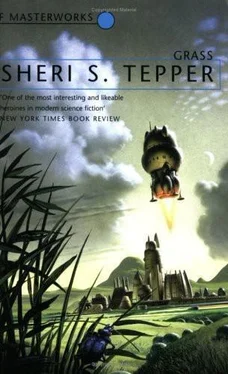Sheri Tepper - Grass
Здесь есть возможность читать онлайн «Sheri Tepper - Grass» весь текст электронной книги совершенно бесплатно (целиком полную версию без сокращений). В некоторых случаях можно слушать аудио, скачать через торрент в формате fb2 и присутствует краткое содержание. Город: London, Год выпуска: 2002, ISBN: 2002, Издательство: Gollancz, Жанр: Фантастика и фэнтези, на английском языке. Описание произведения, (предисловие) а так же отзывы посетителей доступны на портале библиотеки ЛибКат.
- Название:Grass
- Автор:
- Издательство:Gollancz
- Жанр:
- Год:2002
- Город:London
- ISBN:9781857987980
- Рейтинг книги:4 / 5. Голосов: 1
-
Избранное:Добавить в избранное
- Отзывы:
-
Ваша оценка:
- 80
- 1
- 2
- 3
- 4
- 5
Grass: краткое содержание, описание и аннотация
Предлагаем к чтению аннотацию, описание, краткое содержание или предисловие (зависит от того, что написал сам автор книги «Grass»). Если вы не нашли необходимую информацию о книге — напишите в комментариях, мы постараемся отыскать её.
Grass — читать онлайн бесплатно полную книгу (весь текст) целиком
Ниже представлен текст книги, разбитый по страницам. Система сохранения места последней прочитанной страницы, позволяет с удобством читать онлайн бесплатно книгу «Grass», без необходимости каждый раз заново искать на чём Вы остановились. Поставьте закладку, и сможете в любой момент перейти на страницу, на которой закончили чтение.
Интервал:
Закладка:
“You warned us that time,” she said, reaching out to him. “I know how hard for you it must have been.”
He took her hand and laid it along his cheek. Only that. But it was thus that Rigo saw them.
Sylvan excused himself, bowed, and went away to find Rowena. “A pleasant tete-a-tete.” Rigo smiled fiercely. She was too preoccupied to notice the quality of that smile. “Rigo, you must not ride.”
“Oh, and why is that?”
“Sylvan says—”
“Oh, I think it matters very little what Sylvan says.” She looked at him uncertainly. “It matters a great deal. Rigo, the Hippae are not merely animals. They… they do something to their riders. Something to their brains.”
“Clever Sylvan to have thought up such a tale.”
“Do you think he invented it? Don’t be silly. It’s obvious. It’s been obvious to me since we saw the first Hunt, Rigo.”
“Oh?”
“And since last night. For the love of God, Rigo. Didn’t it strike you as odd that no one blamed the Hippae? Here’s this girl who disappeared during a Hunt, and no one blames the Hippae she was riding on?”
“If you disappeared during a Hunt, my dear, and turned up later as a courtesan in some petty principality, should I blame your horse?” He gave her a wintry glance, then left her there, staring after him, trying desperately to figure out what had happened.
9
In the Friary of the Green Brothers, nights sat gently upon the sills. The great, night-freezing cry which haunted the southern latitudes was seldom heard here, though whole choruses of grublike peepers filled the dark hours with dulcet sound. Days were spent in labor, nights in sleep. Brothers, so it was said, had once spent their time in study, but little study was needed here. All the questions had been reduced to doctrine; all the doctrine had been simplified to catechism; all the catechism had been learned long ago. Besides, what would the penitents do with more knowledge? They had no use for it here. The Friary sat upon shortgrass prairie, though there were tall grasses not far away. Every year in mid to late summer the Brothers went out to cut down quantities of strong, thick grass stems that grew to the height of seven or eight tall men. Other Brothers remained behind them at the Friary, digging deep and narrow trenches, in parallel pairs, outlining the new halls which would be needed during the Grassian year. Though penitents grew old and penitents died, the number of Brothers kept growing. Seemingly it was becoming a more frequent happening for acolytes of Sanctity to fly apart, like fragile wheels, spun too fast.
When the great grasses had been sawn through and tied in bundles, they were dragged back to the Friary and upended side by side in the waiting trenches. The top of each bundle was pulled over and tied partway down the bundle in the opposite ditch until the whole double line had been bowed into a vaulted hall which would be roofed with thatch, its openings walled with panels of woven grass. Within this lofty space the Brothers would build whatever kind of rooms were needed: a new chapel or kitchen or another set of cells.
So space was enclosed, said the historians of the order, long ago on another world by people who lived among tall grasses. The historians did not say what such people did in the winter. During winters on Grass, the Brothers retired below to a cramped underground monastery where they suffered through a lengthy season of sequestered and jam-packed irascibility. Winters drove more than a few of them past the pale of sanity. A sick wildness lurked among the brethren — skulking, endemic, more often erupting among the younger than among the aged. The old felt themselves past hope, but the young had hope continually frustrated and as continually strained against their frustration in strange and dangerous ways.
In the summer Friary, there was room enough for frustration to find an out. The narrow halls sprawled this way and that among the low grasses, some making vaulted cloisters around enclosed gardens, some with doors opening upon wide vegetable plots, some giving upon farmyards where chickens scratched or pigs grunted contentedly in their pens. If it had not been for the towers, the Friary could have been a tumulus left by a great tunneling mole, the round-topped halls dried to very much the color of the native soil.
But there were towers — towers everywhere. Demented with boredom, young Brothers had been erecting these grass-stalk steeples for decades. At first they were mere tapering masts, no taller than fifteen men, or twenty, topped by plumy seed-head finials. Later more elaborate three- and five-legged monstrosities had climbed into a cloud-streaked sky, almost beyond the sight or belief of those on the ground — always more towers, and more.
Over the wide courtyards lacy needles soared, their joints securely tied with tough ropes of wiregrass. Rearing upward at each juncture of the reed-vaulted halls, spidery pinnacles pierced the clouds Filigree masts rose above the kitchens and gardens. Outside the precincts of the Friary, forests of spicules like those of some lacework sea urchin thrust into the Grassian sky in myriad gothic spires. From any place within or around the Friary, one could not look up without seeing them, fantastically high and ridiculously fragile, the steeples of the climbers.
Upon these structure young Brothers, shrunk by distance into the stature and compass of spiders, had crawled and swung among the clouds, trailing their slender ropes behind them, connecting all the towers with bridges which seemed no wider than a finger, scarcely stronger than a hair. Up ladders thin and wavery as web silk they climbed to the high platforms to keep watch. At first they had watched for hounds, or for grazers. Then they watched for golden angels like those on the towers of Sanctity, so said some of them, disillusioned with watching when no one ever saw anything interesting. Lately they had made a sport of seeing indescribable things, or so they said, and Elder Brother Laeroa had all he could do to keep them out of the hands of Doctrine. Jhamlees Zoe would have relished a good disciplinary session or even a trial for heresy. Those in the Office of Acceptable Doctrine were, after all, as bored as everyone else.
Over the decades the towers had been climbed by amateurs, then by enthusiasts, and finally by experts who had invented a cult with its own hierarchs and acolytes, its own rituals of baptism and burial, its own secrets shared among its own adherents. Each new acolyte was tested within days of his arrival to know whether he would be one of the climbers or not. When Brother Mainoa first warned Brother Lourai that the climbers would be after him, he spoke no more than the truth.
They did not wait long.
Brother Lourai, lately Rillibee Chime, sat in the refectory as generations had sat before him, the front of his robe rubbing another layer of gloss upon the table edge, waiting for the gong which would allow him to rise from the table, carry his plate to the service hatch, and then go out to the washing house for his evening duty. The voice which whispered at him came as a surprise, for it came from behind him. Nothing was there but a blank walled end of the hall without even a shelf on it.
“You, Lourai,” it said. “Pay attention.”
He looked up and around, doing it slowly so as not to attract attention. His nearest neighbors were some distance away, minor functionaries recently sent to beef up the Office of Acceptable Doctrine, or so Mainoa had said, and the least notice attracted from them, the better.
He saw nothing but the woven mats which made up the end wall of the hall. “You,” came the voice again. “After duty tonight. Time for your initiation.”
The sound that followed was suspiciously like a giggle, a nasty giggle, almost a snigger. Rillibee closed his eyes and prayed for help. All that came in answer was the sound of the old men shouting at one another far away on the dais. After a time, Rillibee opened his eyes and looked around him, wondering if he could find anything in the Great Refectory which would help him.
Читать дальшеИнтервал:
Закладка:
Похожие книги на «Grass»
Представляем Вашему вниманию похожие книги на «Grass» списком для выбора. Мы отобрали схожую по названию и смыслу литературу в надежде предоставить читателям больше вариантов отыскать новые, интересные, ещё непрочитанные произведения.
Обсуждение, отзывы о книге «Grass» и просто собственные мнения читателей. Оставьте ваши комментарии, напишите, что Вы думаете о произведении, его смысле или главных героях. Укажите что конкретно понравилось, а что нет, и почему Вы так считаете.












